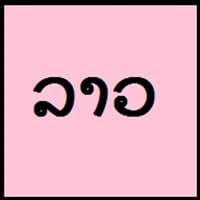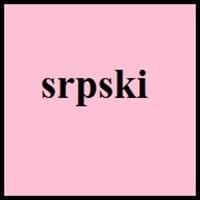Countries
Laos
Bosnia and Herzegovina, Kosovo, Serbia, Slovakia
National Language
Laos, Northeastern Thailand
Bosnia, Croatia, Montenegro, Serbia
Second Language
Not spoken in any of the countries
Not spoken in any of the countries
Speaking Continents
Asia
Europe
Minority Language
Not spoken in any of the countries
Croatia, Czech Republic, Hungary, Macedonia, Montenegro, Romania, Slovakia
Regulated By
Not Available
Board for Standardization of the Serbian Language
Interesting Facts
- There is no space left between words, only between phrases or sentences in Lao language.
- The Lao alphabets has been reformed many times over the past 50 years.
- Serbian language was derived from the Old Church Salvic, as the language was commonly spoken by most of Slavic people in the 9th Century.
- Serbian language is based on Stokavian dialect.
Similar To
Thai Language
Bosnian and Croatian Languages
Derived From
Pali, Sanskrit and Old Khmer Languages
Not Available
Alphabets in
Lao-Alphabets.jpg#200
Serbian-Alphabets.jpg#200
Scripts
Thai and Lao Braille
Cyrillic, Latin
Writing Direction
Left-To-Right, Horizontal
Left-To-Right, Horizontal
Hello
ສະບາຍດີ (sába̖ai-di̖i)
Здраво (Zdravo)
Thank You
ຂອບໃຈ (khàwp ja̖i)
Хвала лепо (Hvala lepo)
How Are You?
ສະບາຍດີບ (sába̖ai-di̖i baw?)
Како си? (Kako si?)
Good Night
ໃນຕອນກາງຄືນ ທີ່ດີ (naitonkangkhun thidi)
Лаку ноћ (Laku noć)
Good Evening
ສະບາຍດີຕອນແລງ (sa bai di ton aelng)
Добро вече (Dobro veče)
Good Afternoon
ສະບາຍດີຕອນສວາຍ (sa bai di ton suaai)
Добар дан (Dobar dan)
Good Morning
ສະບາຍດີຕອນເຊົ້າ (sa bai di ton sao)
Добро јутро (Dobro jutro)
Please
ກະລຸນາ (kaluna)
Молим (Molim)
Sorry
ຂໍອະໄພ (khooaphai)
Жао ми је (Žao mi je)
Bye
Sôhk dii der
Довиђења (Doviđenja)
I Love You
ຂ້ອຍຮັກເຈົ້າ (khony hak chao)
Волим те (Volim te)
Excuse Me
ຂໍໂທດ (kho othd)
Извините (Izvinite)
Dialect 1
Vientiane Lao
Prizren-Timok
Where They Speak
Laos
Southeastern Serbia
Dialect 2
Northern Lao
Smederevo–Vršac
Where They Speak
Laos
Serbia
Dialect 3
Central Lao
Torlakian
Where They Speak
Laos
Bulgaria, France, Kosovo, Macedonia, Romania, Serbia
How Many People Speak
Not Available
Speaking Population
Not Available
Not Available
Native Name
ພາສາລາວ (pháasaa láo)
српски (srpski) српски језик (srpski jezik)
Alternative Names
Eastern Thai, Lào, Lao Kao, Lao Wiang, Lao-Lum, Lao-Noi, Lao-Tai, Laotian, Laotian Tai, Lum Lao, Phou Lao, Rong Kong, Tai Lao
Montenegrin
German Name
Laotisch
Serbisch
Pronunciation
pʰáːsǎː láːw
[sr̩̂pskiː]
Ethnicity
Not Available
Serbs
Origin
1283 CE
11th Century
Language Family
Tai-Kadai Family
Indo-European Family
Subgroup
Tai
Not Available
Branch
Not Available
Not Available
Early Forms
No Early forms
No early forms
Standard Forms
Lao
Standard Serbian
Language Position
Not Available
Signed Forms
Not Available
Not Available
Scope
Individual
Individual
ISO 639 6
Not Available
Not Available
Glottocode
laoo1244
serb1264
Linguasphere
No data available
53-AAA-g
Language Type
Living
Living
Language Linguistic Typology
Subject-Verb-Object
Subject-Verb-Object
Language Morphological Typology
Isolating
Not Available
Lao and Serbian Greetings
People around the world use different languages to interact with each other. Even if we cannot communicate fluently in any language, it will always be beneficial to know about some of the common greetings or phrases from that language. This is where Lao and Serbian greetings helps you to understand basic phrases in Lao and Serbian language. Lao word for "Hello" is ສະບາຍດີ (sába̖ai-di̖i) or Serbian word for "Thank You" is Хвала лепо (Hvala lepo). Find more of such common Lao Greetings and Serbian Greetings. These greetings will help you to be more confident when conversing with natives that speak these languages.
Lao vs Serbian Difficulty
The Lao vs Serbian difficulty level basically depends on the number of Lao Alphabets and Serbian Alphabets. Also the number of vowels and consonants in the language plays an important role in deciding the difficulty level of that language. The important points to be considered when we compare Lao and Serbian are the origin, speaking countries, language family, different greetings, speaking population of these languages. Want to know in Lao and Serbian, which language is harder to learn? Time required to learn Lao is 44 weeks while to learn Serbian time required is 44 weeks.





